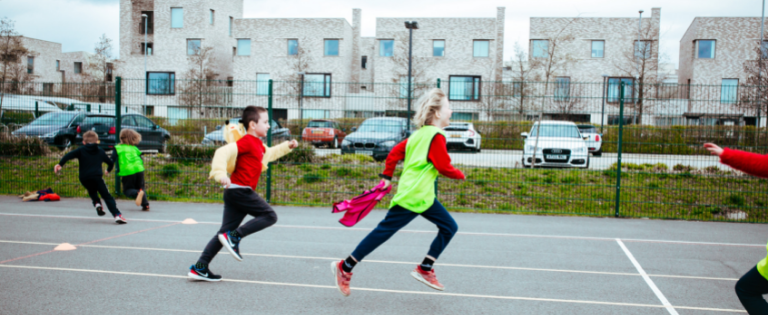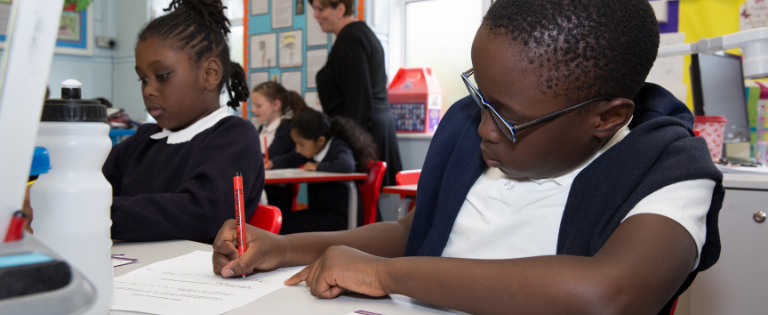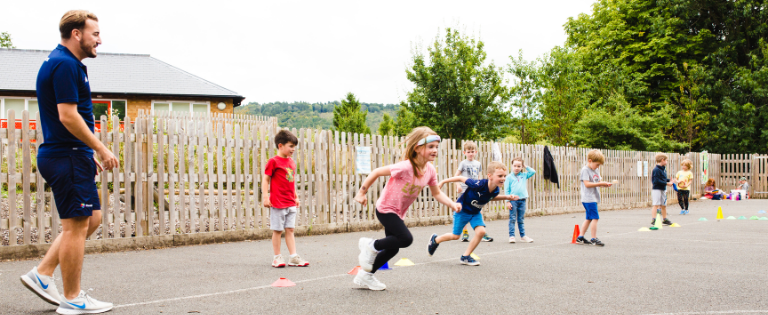Why PE is Important for Health and Personal Development
Physical education has long been the undervalued – and often dismissed – subject of the school curriculum. Derided as a ‘break’ from the more important academic lessons, PE has a reputation for being merely a chance for kids to slack off and play a few games.
But recent studies have shown that a well-rounded PE curriculum can improve everything from physical health to mental, social and cognitive capabilities. It could even reduce the risk of heart disease, insomnia and depression.
Participation in physical education lessons plays an important role in the health and personal development of children; setting them up with good habits in this vital early stage of their lives.
We will lead you through what exactly it is that makes PE so essential for both health and personal development.

The importance of PE for primary-aged children
Children between the ages of 5 and 18 should be participating in at least 60 minutes of moderate to vigorous exercise every day, according to the NHS.
Less than half are meeting these requirements.
With all the unprecedented difficulties and stress faced by children and young people in the last few years, it would be easy to let something as seemingly innocuous as PE fall to the wayside.
But the importance of remaining active cannot be understated. It’s incredibly important for people of all ages. In children, it is absolutely vital.
Three days a week, physical activities should be high intensity to help develop muscles and strengthen bones. In order to reap the many benefits of regular activity, children need to be introduced to a wide variety of sports that cater to every aspect of their physical development.
Getting started early is key. Physical education in primary schools plays an irreplaceable role in promoting physical activity from the outset.
There are few opportunities for children to try different sports outside of school. PE gives primary-aged children the chance to learn new skills, enjoy regular exercise, and engage in brand new experiences – all within the school day.
Why is PE important for your health?
An active lifestyle is essential for preventing health issues like heart disease and diabetes. With an ever-increasing obesity problem among children in the UK, PE – and physical exercise in general – is becoming a crucial part of the curriculum.
1 in 4 children are leaving primary school obese, according to a report conducted by the NHS; an effective PE programme could help in reducing these numbers.
Beyond the fitness aspects of PE, its importance in developing social skills and cognitive abilities is becoming increasingly apparent. Developing physical skills is only half the battle; memory, focus, motor skills and mental health can all be vastly improved when regularly engaging in PE lessons.
Building social skills and friendships during PE can help boost self-esteem, and in doing so improve a child’s mental health and personal development.

7 benefits of physical education
Improves physical health
Somewhat unsurprisingly, PE is known to have a positive impact on your physical well-being. Physical education teaches children the importance of remaining active. Getting into the habit of exercising regularly comes with a whole swathe of health benefits: it improves your immune system, heart health, and lowers cholesterol – and that’s only scratching the surface.
Psychological benefits
While the physical benefits of PE may not be too shocking, the psychological benefits may surprise you. Research shows that PE has a positive effect on mental health and cognitive abilities. The endorphins released when exercising help combat a whole host of mental health issues, including depression and anxiety.
Social and emotional benefits
PE lessons are normally group-focused. They typically involve working together in group exercises and team sports, often requiring effective communication to reach a common goal. PE is unlike any other subject in school – it is perfect for building social and leadership skills. A lesson from a capable PE teacher with the right tools will improve the self-confidence of students, create friendships, and enhance communication skills.
PE improves sleep
Exercise reduces the time it takes to fall asleep and increases the amount of time spent in deep sleep each night. Deep sleep is the most important part of the sleep cycle for children, as it is the most physically restorative phase.
Improved cognition
Physical activity gives your cognitive abilities a boost. Memory, focus, self-control and general brain function are improved – potentially leading to better grades and performance.
Improves academic performance
According to WHO, the link between physical activity and academic performance is closer than you might think. PE has been shown to improve focus, self-discipline, and brain development. The benefits of an improvement in cognitive development and boost to self-esteem have a knock-on effect on grades.
PE can help with anxiety and lowering stress
Regular aerobic exercise reduces tension, stabilises mood levels and boosts self-esteem. The endorphins released while exercising have a positive effect on your mood; PE is a fantastic outlet for reducing anxiety and stress. Keeping physically active generally leads to better mental health.

How to enhance the PE provision at your school
PE is particularly essential in the development of children from the ages of 5-11.
It’s an impressionable time in the life of young students. If physical education as a subject is underwhelming, unimaginative and lacking in structure, it will inevitably fail to grab the attention of young children.
To encourage the whole class to participate, and for every aspect of their development to be addressed, the curriculum needs to be carefully curated. While it is the tendency of adults to focus on the physical benefits of sports and fitness activities, for kids it is all about the enjoyment.
Premier Education
At Premier Education, we understand that enjoyment and physical education should be intrinsically linked. Children should be excited to participate in these sessions, but they must be crafted with purpose; we should also be seeing strides in their health and personal development.
Affordable solutions
It isn’t always easy for schools to schedule – or afford – the elite training usually required to achieve the best possible learning experience. But our tailor-made curricular solutions offer an accessible alternative.
Curriculum support
We provide thousands of schools with bespoke PE & Personal Development solutions. Aligning with PESSPA, we craft a curriculum that takes into account the individual needs of each of our partner schools, all in accordance with the guidelines of the PE national curriculum and Education Inspection Framework (EIF).
Premier Education provides a fully sequenced, high-quality curriculum that supports the rounded development of primary-aged children. Combining lessons that are engaging with a focus on skill development, building character, and encouraging creativity and confidence.
Effective teacher training
As part of our bespoke curriculum support, our activity professionals are able to demonstrate how they deliver engaging PE sessions, giving your teachers the opportunity to learn.
However, if your school would like specific training on delivering physical education classes, B11 training will help your school support the growth and health of your pupils within the school day.
Would you like to find out more about how Premier Education can support your school? Get in touch today.

